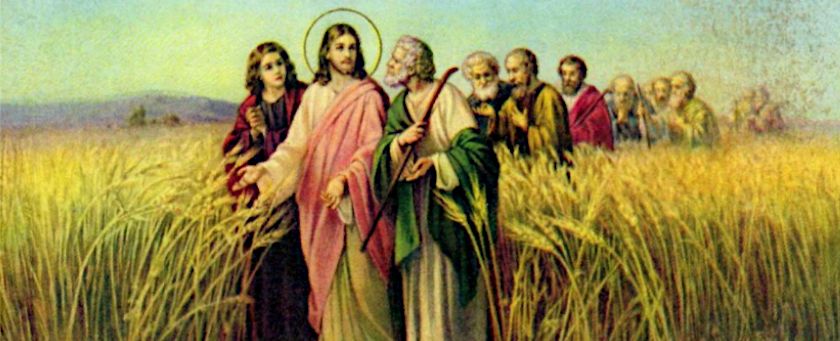An Image of Heaven: Fields of Gold
Sixteenth Sunday of Ordinary Time, Year A

Readings:
Wis.12:13, 16-19; Ps. 86; Rom. 8:26-27; Mt. 13:24-30
Last week, I spoke about the importance and the value of family from a Catholic perspective. From the very first human beings, we see the significance of family: how husband and wife, along with their children, are the basic unit of community, and how that fundamental cell provides the ideal atmosphere for human flourishing. After all, the first commandment God gives humankind is: “Be fruitful and multiply.” And the beauty of this structure is that it was exactly the way God had intended it. Why else would God have created man and woman in his own image, in the image of the Creator, the image of the One who makes all things possible, if not to give us all a share in God’s own creative work? And if God intended for all of us to participate in his creation, could we not also deduce that this is what the Good God of Creation intended from the very beginning?
But, as we all know, the first humans fell into temptation because they were led astray by the Evil One. This led them down a selfish path of destruction, division, and domination, seeking to make themselves gods rather than remain faithful to the Creator. They made for themselves idols and worshipped them in place of the One True God. Yet, in spite of the waywardness of humankind, God remains lenient, and He teaches us through justice and mercy. And whenever things get out of control, the Spirit himself, as St. Paul says, “intercedes with inexpressible groanings.” And I believe we have all heard this groaning, but are we listening? God does not groan for no good reason; God does not complain for the sake of complaining as we humans do, rather, the Spirit searches the hearts of those who desire God’s will, and intercedes for these holy ones. In other words, God invites each of us to make our hearts one with his own. But, how?
Jesus uses the image of the weeds and the wheat as an analogy for life on earth. The wheat is a symbol of the good fruit of the earth, fruit that nourishes and sustains life; the weeds, on the other hand, are a symbol of that which drains life. Jesus says these weeds were planted by an enemy, whom he later describes as the Devil and the weeds as his minions; the wheat, on the other hand, are the children of God. And while the children of God seek to be fruitful and multiply, to spread the Good News throughout the land, the children of the Evil One seek to tangle and ensnare them. Anyone knows that weeds grow up and around other plants, choking them, making it difficult for the good plants to grow. It is no different in the life of the Christian. Perhaps today, more than ever, we find ourselves being choked by weeds, by godless people, seeking to dominate rather than germinate. Yet, the Good God of Creation is lenient to all. Jesus says, let the weeds grow alongside the wheat. Perhaps this is a challenge to us? Will we allow ourselves to flourish in spite of obstacles standing in our way, or will we allow ourselves to be choked out by evil? We, who work against the evil we encounter, we who remain faithful to the One True God, are bearing fruit for the kingdom. And when our fruit is ripe, at the time of harvest, the weeds, the children of the Evil One, will be bundled for burning, but the wheat, the children of God, will all be gathered together, as one family, into the Lord’s house. Now, that’s an image of heaven we can all look forward to. Amen.
Given during the COVID-19 pandemic.





Share this post
Twitter
Facebook
Pinterest
Email